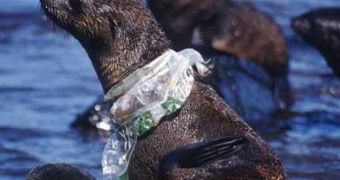One of the most sad images that unfortunately describes the reality so well, is a picture of an animal trapped inside plastic debris. This shows how people's everyday actions and unconsciousness affect poor innocent animals that no one might ever see.
In 2008 boat expeditions around the Antarctic seas discovered plastic residues floating around. This rose concerns about the impact that plastic pollution has on ecosystems and on these rather untraveled waters.
Plastic dumps were known to exist in the Pacific and Atlantic oceans, but nobody imagined that it could reach the Antarctic waters. Plastic in the water comes from several sources like ships, coastal towns or garbage dumps. They are carried by the currents of the oceans and mainly float on the surface.
Ecologists and scientists in general worry that the plastic will degrade because of ultraviolet and it will decompose in microscopic fragments that will eventually affect marine animals and contaminate the food chain. Pieces like plastic bags, that do not decompose can endanger animals that get caught in them.
Greenpeace and British Antarctic Survey did a large survey, looking for plastic around Antarctica, in the austral summer 2007-2008. They found no large pieces of plastic affluence in these seas but they did find plastic detritus in places with no human presence. The survey's results are published in this year's August issue of Marine Environmental Research.
Scientists fear that plastic waste coming from different regions of the world, might also bring new organisms, potentially harmful for the animals living in Antarctica. David Barnes of the British Antarctic Survey, and member of one of the expeditions, said that the plastic floating around the globe creates “a whole new habitat and a whole new possibility of animals getting around."
He added that there is a possibility that plastic waste will gradually invade Antarctic waters, because it is a phenomenon almost impossible to prevent.

 14 DAY TRIAL //
14 DAY TRIAL //